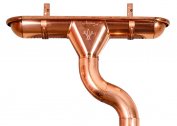The reasons for the clogging of the drain pipes in the bathrooms are hair and paper, but in the kitchen there is accumulated fat. Many do not know how to remove fat in the sewers, as they do not pay due attention to this problem.
The reasons for the accumulation of fat and its danger
 Various wastes are daily drained into sewer pipes: dirt, hair, grease, chemicals. If at the installation stage rules or norms were violated, for example, the angle of inclination of the system is not maintained, then the fat, not having time to leave, begins to collect on the walls, gradually clogging the pipeline. This problem is typical for cast-iron pipes, since their coating inside is not smooth, which contributes to the attachment of fatty deposits.
Various wastes are daily drained into sewer pipes: dirt, hair, grease, chemicals. If at the installation stage rules or norms were violated, for example, the angle of inclination of the system is not maintained, then the fat, not having time to leave, begins to collect on the walls, gradually clogging the pipeline. This problem is typical for cast-iron pipes, since their coating inside is not smooth, which contributes to the attachment of fatty deposits.
Fat enters the pipes along with food waste that people drain into the sewer system or when washing greasy kitchen utensils.
The danger of fat deposits in pipes lies not only in the inconvenience associated with the operation of the sewage system, but also with the emergence and reproduction of bacteria and microorganisms dangerous to health. In addition, the drain will constantly smell unpleasant.
To restore the operation of pipelines, it is necessary to eliminate the fatty growths that form on the walls. In some cases, this can be done indiscriminately in the sewer system; it is enough to know several effective methods.
Cleaning methods
Cleaning methods can be divided into folk (using improvised means), chemical and mechanical. The choice largely determines the degree of clogging and the location of the cork. To get the best result, experts recommend combining the methods.
Tools at hand
 The cleaning of the pipeline in this case is carried out using the means that are available in the kitchen of each housewife. As a rule, this is vinegar, soda and citric acid.
The cleaning of the pipeline in this case is carried out using the means that are available in the kitchen of each housewife. As a rule, this is vinegar, soda and citric acid.
The most popular folk methods:
- Soda - an effective tool that copes with fat. To eliminate clogging, pour a glass of the product into the drain hole, and then pour boiling water. Close the drain with a stopper and do not use the sink for several hours. This method is suitable for all types of pipes.
- Vinegar and soda is a universal remedy that is considered more effective than the previous one. Instead of vinegar, you can use citric acid, but in this case, the substances are taken in equal proportions. Soda should be put out with a little vinegar. As a result, a pinching mass is obtained that perfectly breaks down fat deposits. The gas generated by the chemical reaction will help push the blockage through. But for this method, there are limitations - it is allowed only for plastic pipes. Acid corrodes metal surfaces.
- Soda is another way to fight fat. Coca-Cola, sprite and other similar effervescent drinks, which contain phosphoric acid, are suitable. It then helps eliminate fatty plugs. The only negative is dyes, which are added to soda. They can stain white plumbing, so it is recommended to use clear drinks to clean the sinks.
- Chlorine - this includes household cleaning products that are used in washing. For example, ordinary chlorine-based bleach. To clean the blockage, it is poured in a large volume (sometimes several liters) into the drain and rinsed abundantly with running water. Some advise using hydrochloric acid to clean the sewer system.
Preparations
 When choosing drugs to eliminate body fat in pipes, it is important to pay attention to their composition. The most effective are those that contain a strong alkali, usually sodium hydroxide (caustic soda).They are produced in granular, gel-like form. Less common are liquids. Sodium hydroxide not only eliminates grease and soap film, but also disinfects the system from the inside. As an aid, manufacturers include antiseptics and surfactants. Of the available and effective tools in this series, Super Mole can be noted.
When choosing drugs to eliminate body fat in pipes, it is important to pay attention to their composition. The most effective are those that contain a strong alkali, usually sodium hydroxide (caustic soda).They are produced in granular, gel-like form. Less common are liquids. Sodium hydroxide not only eliminates grease and soap film, but also disinfects the system from the inside. As an aid, manufacturers include antiseptics and surfactants. Of the available and effective tools in this series, Super Mole can be noted.
Similar household chemicals are produced by other companies. For example, Mr. Muscle, Trublon, Tyreth, Pothan. The composition of all of them is identical, therefore, choosing from the proposed ones, you can safely purchase the cheapest.
Typically, chemicals are sold in unit packs, each designed for only 1 use. It is advisable not to purchase large bundles and then store them open. Active substances interacting with the environment under the influence of moisture fall on the surface and corrode them.
Important! When using chemicals, safety precautions must be observed - all work must be done with a respiratory mask and gloves.
The method of application is usually written on the packaging. If it is a liquid, then it is poured in a volume of 200 - 250 ml into the drain and left for 1-2 hours. If the preparation is granular or gel-like, pour 1 package into the drain hole, pour boiling water over half a liter and also leave it for 2 hours. After passing the appointed time, the system is washed with hot water from the tap.
Mechanical means
 If the blockage cannot be eliminated by the above methods, you will have to resort to more radical measures - use mechanical means to eliminate blockages:
If the blockage cannot be eliminated by the above methods, you will have to resort to more radical measures - use mechanical means to eliminate blockages:
- Plunger. It is applied to the hole so that the rubber is in close contact with the surface of the shell. Pushing up and down creates pressure in the pipe, it helps push the cork through. This device is easy to use and does not take up much space.
- Plumbing cable. It can be of various lengths - up to 50 meters, but 3 meters is enough for home use. A special cutting tip is installed on one end, and a rotation handle on the other. The cable is gradually pushed into the pipe, turning the handle. Thus, clogging is eliminated, the remaining sediments are washed with boiling water. To eliminate complex congestion, a steel tape is used. It is equipped with a convenient handle and various nozzles.
Important! Mechanical methods eliminate only fat deposits, but are not able to cope with harmful bacteria. For disinfection, additional chemicals should be used.
Problem prevention
Everyone knows that it is better to prevent the occurrence of a problem than to spend money and time on fixing it later. Experts recommend monitoring the condition of sewer pipes in their home. For prevention, it is enough to use one package of a chemical agent once every 1-3 months. Usually, the drug is put to sleep at night, and in the morning the system is washed. The frequency of course depends on the utilization of the sink.
Handicrafts such as soda and vinegar described above are also suitable for preventing the formation of fatty plugs. They may not be able to cope with serious congestion, but they are excellent for prevention. And further cleaning of the sewage system from fat will become much easier.


